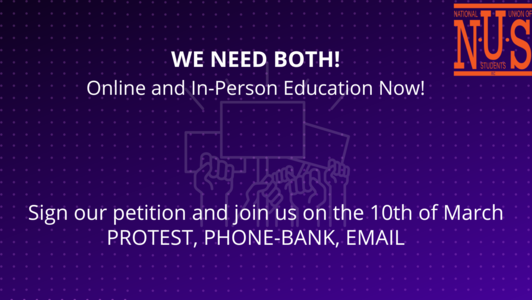100 signatures reached
To: Minister Clare, Senator Faruqi, Senator Steele-John, Minister Shorten, Senator Thorpe, Senator Hanson, Senator Roberts, Senator Babet, Senator Lambie, Senator Tyrrell, Senator Pocock, Hon. Tudge, Hon Sukkar,
We Need Both! Online and In-person options for Tertiary Education
.png)
We come together to ask for hybrid and flexible (‘hyflex’) education for staff & students engaged in higher education. Offering both in-person and online options for education are better for disabled staff and students, better for working students, better for carers and new parents, better for victim-survivors, and better for international students.
We need both!!!
1. Reverse TEQSA’s “return to compliance” code change which mandates that international students cannot complete more than a third of their units online.
2. Change the National Code of Practice for Providers of Education and Training to Overseas Students Act 2018 so international students can access a fully online or in person degree.
3. Endorse and urgently implement all the recommendations of the 2022 ALSA-AMSA-NUS Research Report (‘Disability & Higher Education in Australia’), including but not limited to:
Recommendation 2.1: Universities should offer options for both face-to-face and remote study consistent with NCSEHE recommendations for educational staff to transition to expanded hybrid/hyflex/blended learning approaches to retain accessibility and flexibility in learning opportunities. As a minimum, this should include work from home (‘WFH’) options for disabled students and disabled academics for whom WFH would constitute a reasonable accommodation. Online options should be fully resourced to support staff and not impose extra workload.
We need both!!!
1. Reverse TEQSA’s “return to compliance” code change which mandates that international students cannot complete more than a third of their units online.
2. Change the National Code of Practice for Providers of Education and Training to Overseas Students Act 2018 so international students can access a fully online or in person degree.
3. Endorse and urgently implement all the recommendations of the 2022 ALSA-AMSA-NUS Research Report (‘Disability & Higher Education in Australia’), including but not limited to:
Recommendation 2.1: Universities should offer options for both face-to-face and remote study consistent with NCSEHE recommendations for educational staff to transition to expanded hybrid/hyflex/blended learning approaches to retain accessibility and flexibility in learning opportunities. As a minimum, this should include work from home (‘WFH’) options for disabled students and disabled academics for whom WFH would constitute a reasonable accommodation. Online options should be fully resourced to support staff and not impose extra workload.
Why is this important?
Online options were ‘too hard’ before 2020, and then they came within a week, and then they were taken away as quickly as they were given. Many members of our community depend on these options being available such as those who are immuno-compromised and cannot risk exposure to disease, especially when universities do not have open windows, air purifiers or a mask or vaccine mandate in the classroom.
Universal Design (‘UD’) — specifically, Universal Design for Learning (‘UDL’) — is a research-backed pedagogy and curriculum framework which enables equitable access to education for all students, including students with disabilities and other students from diverse, minoritised backgrounds. For disabled students, implementing UDL would ostensibly ensure that they can ‘engage with the curriculum without having to seek adjustments’ (see ‘Recommendations for equitable student support during disruptions to the higher education sector: Lessons from COVID-19,’ Mercer-Mapstone et al 2022,). Hybrid, flexible education — also known as ‘hyflex’ education, as noted in Recommendation 2.1 of the ALSA-AMSA-NUS research report — entails offering educational delivery options for both in-person attendance and Work From Home (‘WFH’). Moreover, hyflex education can facilitate educational participation for not only disabled people but also women escaping domestic family violence (‘DFV’) or sexual assault, First Nations students in regional & rural Australia, international students, and other demographics for whom in-person attendance may not be the most safe & accessible.
People from diverse backgrounds have value. Contrary to what many believe, disabled people can (and do) contribute to society and to building a better world. Imagine all the setbacks if Dr Steven Hawking couldn’t come to class because he couldn’t get his wheelchair in the door!
Additionally, the tertiary education regulator, Tertiary Education Quality and Standards Agency (‘TEQSA’), has announced that they will now enforce the Education Services for Overseas Students Act 2000 (Cth) (‘ESOS’). Under ESOS in s 8.19, TEQSA is mandating that no more than a third of the education delivered to overseas students can be online or by distance. This decision from TEQSA means that if international students want to access regional, globally ranked education, they must return to Australia whilst there are COVID-19 outbreaks overseas, a rental shortage of affordable, student housing and a cost-of-living crisis. This forces numerous international students into a tricky conflict between their future and their present happiness. TEQSA doesn’t take individual complaints so the regulator cannot protect international students. That is why the government must step up.
Likewise, online learning can be better for university staff. University staff with disabilities also face many of the struggles that disabled students do. Likewise, staff with caring roles for children or other dependents benefit from increased access to them by providing education online. Some universities do not have child-care options after 5pm, meaning that staff cannot afford to work a 9-5 with children because they have to rush to collect them. The higher education system relies on these staff and their incredible work to upskill the next generation.
Universal Design (‘UD’) — specifically, Universal Design for Learning (‘UDL’) — is a research-backed pedagogy and curriculum framework which enables equitable access to education for all students, including students with disabilities and other students from diverse, minoritised backgrounds. For disabled students, implementing UDL would ostensibly ensure that they can ‘engage with the curriculum without having to seek adjustments’ (see ‘Recommendations for equitable student support during disruptions to the higher education sector: Lessons from COVID-19,’ Mercer-Mapstone et al 2022,). Hybrid, flexible education — also known as ‘hyflex’ education, as noted in Recommendation 2.1 of the ALSA-AMSA-NUS research report — entails offering educational delivery options for both in-person attendance and Work From Home (‘WFH’). Moreover, hyflex education can facilitate educational participation for not only disabled people but also women escaping domestic family violence (‘DFV’) or sexual assault, First Nations students in regional & rural Australia, international students, and other demographics for whom in-person attendance may not be the most safe & accessible.
People from diverse backgrounds have value. Contrary to what many believe, disabled people can (and do) contribute to society and to building a better world. Imagine all the setbacks if Dr Steven Hawking couldn’t come to class because he couldn’t get his wheelchair in the door!
Additionally, the tertiary education regulator, Tertiary Education Quality and Standards Agency (‘TEQSA’), has announced that they will now enforce the Education Services for Overseas Students Act 2000 (Cth) (‘ESOS’). Under ESOS in s 8.19, TEQSA is mandating that no more than a third of the education delivered to overseas students can be online or by distance. This decision from TEQSA means that if international students want to access regional, globally ranked education, they must return to Australia whilst there are COVID-19 outbreaks overseas, a rental shortage of affordable, student housing and a cost-of-living crisis. This forces numerous international students into a tricky conflict between their future and their present happiness. TEQSA doesn’t take individual complaints so the regulator cannot protect international students. That is why the government must step up.
Likewise, online learning can be better for university staff. University staff with disabilities also face many of the struggles that disabled students do. Likewise, staff with caring roles for children or other dependents benefit from increased access to them by providing education online. Some universities do not have child-care options after 5pm, meaning that staff cannot afford to work a 9-5 with children because they have to rush to collect them. The higher education system relies on these staff and their incredible work to upskill the next generation.
